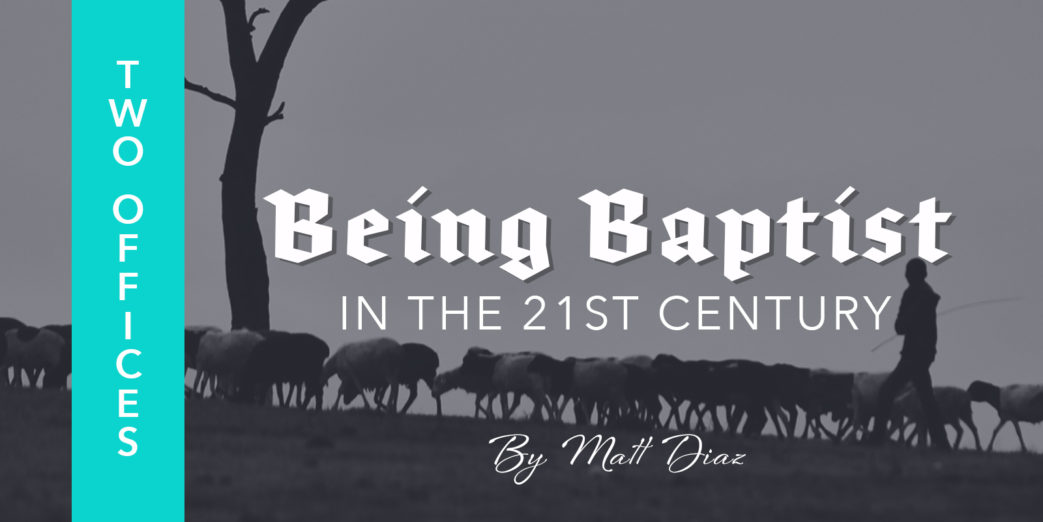Understanding the leadership structure presented in the New Testament is critical for healthy church functioning. To explore this topic, we have links to our two-part podcast on this topic, along with an article listed below.
By Matt Diaz
It’s popular in our day to take business maxims and apply them to the work of the church. While a whole host of dissimilarities exist between the corporate world and outposts of the kingdom of God[1] , these truisms sometimes work for both. Here’s one, from leadership guru John Maxwell, “Everything rises and falls on leadership.”[1]
The question we must ask, then, is, ‘What kind of leadership benefits our churches?’ The Baptist answer has historically been rooted in their understanding of Scripture. A desire for biblical leadership has led Baptists to affirm the New Testament teaching of the two offices of pastor and deacon.[2]
The Baptist Faith and Message 2000, in Article VI on “The Church,” says of a local congregation: “Its scriptural officers are pastors and deacons. While both men and women are gifted for service in the church, the office of pastor is limited to men as qualified by Scripture.”[2] Notice there’s no mention of popes, presbyteries, or denominational officials leading churches. Baptists understand that the only two offices of the church are pastor and deacon.
Pastors
Whereas other Christians have seen the words pastor, elder, and overseer as multiple offices, Baptists understand these words as being used interchangeably for a single office, that of pastor or elder (see Acts 20:17, 28; 1 Peter 5:1-2). When Paul lays out the qualifications for the office (1 Timothy 3:1-7; Titus 1:5-9), he places overwhelming emphasis on character. Pastors are, in some sense, merely exemplary Christians who can say, ‘Follow me as I follow Christ’ (1 Corinthians 1:11). This clearly means that not every man gifted to preach is qualified to pastor a local church. It would be of little benefit to the long-term health of a church for a pastor’s message to be contradicted by his lifestyle. Better to be a faithful member of a church while growing in holiness than to rush ahead to disastrous effect.
When the New Testament mentions the word elder – which Scripture uses synonymously with pastor – it is used in the plural form. Titus should appoint elders (Titus 1:5); Paul visits the Ephesian elders (Acts 20:17); Peter exhorts the elders (1 Peter 5:1)— all plural. While senior or lead pastors will tend to accrue more authority given the frequency of their preaching and teaching (making them worthy of “double honor,” 1 Timothy 5:17), they function as a first among equals, laboring alongside a plurality of pastors for the maturity of their people (Colossians 1:28). As pastors, these men pray (James 5:14), preach and teach the word (1 Timothy 3:2), shepherd (Acts 20:28; 1 Peter 5:2), keep watch over themselves and their families (Acts 20:28), exercise oversight (Acts 20:28; 1 Peter 5:2), set a good example (1 Peter 5:3), and work to raise up other elders (2 Timothy 2:2).[3]
Deacons
The word deacon means servant, and deacons serve by freeing up the church’s pastors to focus on the spiritual needs of the members. While a pastor might spend time during the week in prayer and preparation for a Bible study or sermon, a deacon might serve by leading volunteers, caring for facilities, or making sure the audio equipment allows the preached word to be heard.
Like elders, deacons are to be of respectable character (1 Timothy 3:8-13). But unlike the elders, deacons don’t need to be able to teach. That’s because a deacon’s job responsibilities are different from a pastor’s. You see this distinction begin to take shape in Acts 6. In response to a potential threat to the unity of the fledgling congregation in Jerusalem, proto-deacons are appointed so that the apostles can continue to focus on “prayer…and the ministry of the word” (Acts 6:4). Deacons serve to enable a church’s pastors to serve up the word.
While some may differ, I believe women can be deacons.[3] Though the pastorate is limited to men (1 Timothy 2:12), the office of deacon has no overseeing or teaching responsibilities; therefore, women can serve in it. Women like Phoebe (Romans 16:1) were most likely deaconesses in the early church. If a church lacks clarity in the distinctions between the two offices as outlined above, however, it would seem wise to have only men serve as deacons.
While much more could be said about pastors and deacons and how they relate to one another and the congregation, we must say this: churches that maintain the Scriptural offices of pastor and deacon display the wisdom and glory of God.
[1] https://www.inc.com/peter-economy/44-inspiring-john-c-maxwell-quotes-that-will-take-you-to-leadership-success.html
[2] http://www.sbc.net/bfm2000/bfm2000.asp
[3] The functions of the office of pastor found here are taken from Mark Dever’s book, “Understanding Church Leadership” (2016, B&H).

Matt Diaz
Matt serves as the lead pastor of Kendall Baptist Church. He holds a MA in Church Planting from Southeastern Baptist Theological Seminary and a BS in Sport Management from Palm Beach Atlantic University. Previously, Matt served as a campus pastor of Christ Journey Church, as well as a pastoral intern at Capitol Hill Baptist Church in Washington, DC. He and his wife Allison live and minister in Kendall. They have three children, Ella, Leah, and Hannah.

